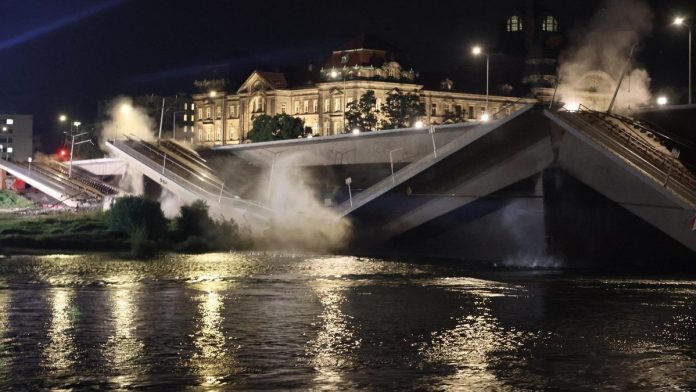The collapse of the Carola Bridge (Carolabrücke) in Dresden showed Germany’s infrastructure appears to be in a poor state, slowing down travel and costing the economy billions.
The collapse of the Dresden bridge shocked many residents of Germany. However, the incident ended without any casualties. The latest collapse is not an isolated case. For instance, throughout the country, bridges are collapsing, railway tracks are rotting, and 100-year-old locks are refusing to operate. The ageing infrastructure in modern Germany is a much greater problem than just an inconvenience.
Sahra Wagenknecht, head of BSW, said regarding the incident: “Fortunately, no one was injured when parts of the Carolabrücke collapsed. Finally, there must be investment measures – repair of dilapidated bridges, roads and schools, and to achieve a resolution of the debt brake must be reformed.”
One in three municipal bridges thus needs to undergo replacement repairs or rebuilding. While things are not much better on motorways and federal highways, slowing mobility, costing the economy billions and putting citizens at risk. Some 4,000 bridges remain in need of repair or replacement.
Tim-Oliver Müller, managing director of the General Association of the German Construction Industry (HDB), said in the Westdeutsche Allgemeine Zeitung the following:
The state of our infrastructure is alarming. We have a huge reconstruction backlog of 372 billion euros.
Thomas Puls, transport economist at the German Economic Institute (IW Cologne), attributes the current state of the infrastructure to the fact that in West Germany many motorways date from 1960 to 1980, meaning they have been in use for about 50 years. In addition, there are trucks on the roads today that can be ten tonnes heavier than they were back then. Today, according to him, the main transport routes lie to Eastern Europe and the Balkans.
Not only bridges are collapsing
However, not only bridges and motorways are collapsing. The railway association Allianz pro Schiene estimates the backlog of railway infrastructure reconstruction at 92 billion euros. As some routes have fallen into neglect for years, the railway is organising the repairs differently this year. Instead of repairing individual damages in stages, the necessary construction work on the railway network should now proceed in a concentrated manner on individual sections. The railway has called the new concept general renovation. As part of the overall reconstruction, 4,000 kilometres of track on 40 routes in Germany aim to complete a comprehensive renewal by 2030.
Apart from roads and railways, the waterways also have significant damage, as many of Germany’s locks date back to the imperial era, Müller said.
The 100-kilometre-long Kiel Canal is the busiest man-made maritime shipping route in the world, but the canal is in a disastrous state. More than 100 construction sites have gone up to prevent embankments from sliding into the canal. Work on Europe’s largest hydraulic construction site, the Brunsbüttel lock, has postponed for years. The fifth lock chamber was originally due to finish in 2018. On the other hand, in Kiel, the Grand Sluice, which has been in operation for more than 100 years, is currently undergoing reconstruction.
Lock locks are as much a bottleneck as bridges and their renovation is grossly underfunded, according to Müller.
The construction industry says there are around 80 accidents a year in West Germany’s sewerage network alone because the minimum height of 5.25 metres required for double-layer container loading is not met. The logistics industry is calling for a special fund for transport infrastructure. Frank Huster, managing director of the Federal Freight Forwarding and Logistics Association, is calling for a dedicated transport infrastructure fund.
A special fund for infrastructure investment may be a major economic stimulus. Every euro invested during construction triggers a subsequent private investment of 2.5 euros, Müller said.
